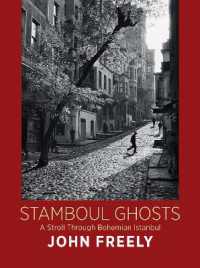- ホーム
- > 洋書
- > 英文書
- > Politics / International Relations
Full Description
In addition to being a major area of research within International Relations, peacebuilding and statebuilding is a major policy area within the UN and other international and regional organizations. It is also a concern of international financial institutions, including the World Bank, and a significant factor in the foreign and security policies of many established and emerging democracies. Peacebuilding and statebuilding are among the main approaches for preventing, managing, and mitigating global insecurities; dealing with the humanitarian consequences of civil wars; and expanding democracy and neoliberal economic regimes. Peace formation is a relatively new concept, addressing how local actors work in parallel to international and national projects, and helps shape the legitimacy of peace processes and state reform.
The Oxford Handbook of Peacebuilding, Statebuilding, and Peace Formation serves as an essential guide to this vast intellectual and policy landscape. It offers a systematic overview of conceptual foundations, political implications, and tensions at the global, regional, and local levels, as well as key policies, practices, examples, and discourses underlining all segments of peacebuilding and statebuilding praxis. Approaching peacebuilding from disciplinary perspectives across the social sciences, the Handbook is organized around four major thematic sections. Section one explores how peacebuilding, statebuilding, and peace formation is conceived by different disciplines and IR approaches, thus offering an overview of the conceptual bedrock of major theories and approaches. Section two situates these approaches among other major global issues, including globalization, civil society, terrorism, and technology to illustrate their global, regional, and local resonance. Section three looks at key themes in the field, including peace agreements, democratization, security reform, human rights, environment, and culture. Finally, section four looks at key features of everyday and civil society peace formation processes, both in theory and in practice.
Contents
1. Introduction: International, State, and Local Dynamics of Peace in the Twenty-First Century
OLIVER P. RICHMOND AND GËZIM VISOKA
PART I: DISCIPLINARY PERSPECTIVES
2. Liberal Internationalism
BEATE JAHN
3. The Ethics of Liberal Peacebuilding
KRISTOFFER LIDÉN
4. The International Law of Peace
CECILIA MARCELA BAILLIET
5. The Social Construction of Peace
JOANNE WALLIS
6. Critical Theory and the Politics of Peace
VIVIENNE JABRI and OLIVER P. RICHMOND
7. Pacifism in International Relations
RICHARD JACKSON
8. The International Political Sociology of Peacebuilding
CATHERINE GOETZE AND BERIT BLIESEMANN DE GUEVARA
9. Spaces of Peace
ANNIKA BJÖRKDAHL AND STEFANIE KAPPLER
10. Peace Methods and Methodologies
PAMINA FIRCHOW
11. Ethnographic Peace Research
GEAROID MILLAR
12. Visuality of Peace and Conflict
EMMA HUTCHISON AND ROLAND BLEIKER
13. Peace in Non-Western Theory
NECATI POLAT
14. Gender, Security, and Peacebuilding
SARAH SMITH
15. Peace Psychology
DANIEL J. CHRISTIE
PART II: PEACEBUILDING AND STATEBUILDING IN GLOBAL POLITICS
16. International interventions
AIDAN HEHIR
17. Peacekeeping
MICHAEL PUGH
18. Protection of Civilians
WALT KILROY
19. The United Nations and the Responsibility to Rebuild
ALEX J. BELLAMY
20. The European Union and Peacebuilding
NATHALIE TOCCI
21. Emerging Powers and Peacebuilding
KAI MICHAEL KENKEL
22. Globalisation of Peace
JACKIE SMITH
23. Global Civil Society, Peacebuilding, and Statebuilding
MARY KALDOR AND DENISA KOSTOVICOVA
24. Networks of Peace
NAJI BSISU AND AMANDA MURDIE
25. Peace, Intervention, and State Fragility
NICOLAS LEMAY-HÉBERT
26. Terrorism and Peacebuilding
IOANNIS TELLIDIS
27. Peace After Revolutions
SANDRA POGODDA
28. Peace and Security in the Age of Hybrid Wars
MARIA RAQUEL FREIRE AND LICINIA SIMÃO
29. Technologies of Peace
ALLARD DUURSMA AND JOHN KARLSRUD
PART III: DISAGGREGATING PEACEBUILDING AND STATEBUILDING
30. Statebuilding
DAVID CHANDLER
31. Democratisation and Peacebuilding
CHRISTOPH ZÜRCHER
32. Power-sharing in Divided Societies
JOHN DOYLE
33. Statebuilding, Security Sector Reform, and the Rule of Law
PAUL JACKSON
34. Transitional Justice and Peacebuilding
CATHERINE TURNER
35. Reconciliation and Peacebuilding
GRÁINNE KELLY
36. Religion and Peacebuilding
JOHN D. BREWER
37. Foreign Aid and Peacebuilding
RACHEL M. GISSELQUIST
38. Local Ownership, Legitimacy, and Peacebuilding
TIMOTHY DONAIS
39. Environmental Peacebuilding
FLORIAN KRAMPE AND ASHOK SWAIN
PART IV: POST-LIBERAL PEACE AND PEACE FORMATION
40. Peace Formation and the Reshaping of International Peacebuilding
OLIVER P. RICHMOND
41. Local Resistance and Hybrid Peace
SUNGYONG LEE
42. Hybrid Political Orders and Customary Peace
VOLKER BOEGE
43. Local Infrastructures for Peace
ANDRIES ODENDAAL
44. Emancipatory Peace
GËZIM VISOKA








